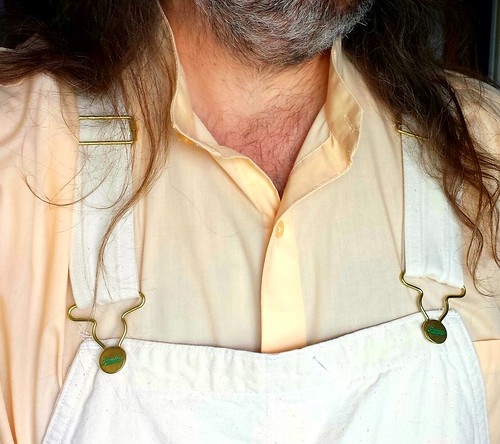Monday, October 31, 2016
Why #ImWithHer
Because.
I think that she is genuinely the best choice in this election. I believe that she would and will be a good President, and that she also represents the best chance to avoid electing a truly awful one. Her chief opponent has said almost nothing that has made any sense at all and a whole lot of things that are terrible. The "third party" options -- which are generally a giant waste of time anyway -- are all laughable in one way or another, whether we're talking about the loopy Libertarian, the oddball Green, or that other guy who is basically Mitt Romney with a better resume.
That's it. Maybe not terribly convincing, but I don't really feel the need to be.
Friday, October 28, 2016
Bad Joke Friday
At the intersection of science and civics....
A school kid asks his teacher, “Is it true that the law of gravity keeps us on Earth?”
The teacher replied, “Yes.”
The kid then asked, “What kept us down before the law was passed?”
Thursday, October 27, 2016
Something for Thursday
In keeping with Halloween, here's some scary movie music:
Tuesday, October 25, 2016
Tone Poem Tuesday
As much as I love the Russian Romantics, the work of Modest Mussorgsky has always left me a little cold. However, it's the Halloween season, and Night on Bald Mountain is a staple of scary music, so...here it is.
Kind of.
I was driving home the other day and Night on Bald Mountain was on the radio, but it wasn't really Night on Bald Mountain. There was a vocal component to it that I had never heard before, and I ended up listening to the entire thing. It turns out that this was an earlier version of the work, called St. John's Night on the Bare Mountain. Confused, I looked the work up when I got home.
Mussorgsky's personal life was apparently something of a mess -- and by that, I mean, he was an absolute wreck. So much so that when he died young, he left behind piles of manuscripts in various states of completion and/or disrepair, which is why the most famous version of Night on Bald Mountain, the one that everyone knows, is actually an edit made by Nikolai Rimsky-Korsakov. (Also, his famous Pictures at an Exhibition's orchestral version is by Maurice Ravel.) At some point, Mussorgsky made a version including child choir, standard choir, and baritone soloist. It's hard to figure out what is Mussorgsky and what belongs to later editors, but this version of the work is, to my ears, more interesting than the standard Rimsky-Korsakov arrangement.
And as a bonus, here's another Halloween-appropriate work, Rachmaninov's Isle of the Dead.
Kind of.
I was driving home the other day and Night on Bald Mountain was on the radio, but it wasn't really Night on Bald Mountain. There was a vocal component to it that I had never heard before, and I ended up listening to the entire thing. It turns out that this was an earlier version of the work, called St. John's Night on the Bare Mountain. Confused, I looked the work up when I got home.
Mussorgsky's personal life was apparently something of a mess -- and by that, I mean, he was an absolute wreck. So much so that when he died young, he left behind piles of manuscripts in various states of completion and/or disrepair, which is why the most famous version of Night on Bald Mountain, the one that everyone knows, is actually an edit made by Nikolai Rimsky-Korsakov. (Also, his famous Pictures at an Exhibition's orchestral version is by Maurice Ravel.) At some point, Mussorgsky made a version including child choir, standard choir, and baritone soloist. It's hard to figure out what is Mussorgsky and what belongs to later editors, but this version of the work is, to my ears, more interesting than the standard Rimsky-Korsakov arrangement.
And as a bonus, here's another Halloween-appropriate work, Rachmaninov's Isle of the Dead.
Monday, October 24, 2016
Friday, October 21, 2016
Thursday, October 20, 2016
Something for Thursday
It's October and it's gloomy in WNY today so here's some of my favorite spooky movie music: Howard Shore's score to The Silence of the Lambs, which remains by far my favorite exploration of the Hannibal Lecter character and one of my favorite horror films.
(If I did this right, it should be an embedded playlist.)
(If I did this right, it should be an embedded playlist.)
Wednesday, October 19, 2016
“She’s so broken insiiiiiide!” (or, why CRAZY EX-GIRLFRIEND is the best thing ever)
Crazy Ex-Girlfriend is about to debut is second season! Huzzah!!
Rachel Bloom has been on my radar screen for quite a while. She’s a hilarious comedian whose main thing, at least as far as I’ve known, has been hysterically funny (and incredibly raunchy) music videos on YouTube and other places on the Internets. The first thing of hers I encountered? A song expressing her sci-fi fandom called “F*** Me Ray Bradbury”, which is still one of the funniest things I’ve ever heard. (Of course it’s NSFW!!!)
Now, along comes Bloom’s show Crazy Ex-Girlfriend, which I knew existed but held off watching until the season was almost over because that’s what I do with new shows. I wait and see if they’re successful before I even try to jump on board, because unless the show is universally agreed upon as being superb, I just don’t want to get invested in shows that only get a single season. I’ve had My So-Called Life and Firefly and I still need to write a post appreciating Freaks and Geeks, but I don’t want another one-year wonder show. Unless, again, it’s awesome.
The good news is that Crazy Ex-Girlfriend is coming back for Season Two. The better news? Well...this might well be a show good enough to watch even if it had only survived for Season One.
The show also filled a niche for us in that we needed a comedy to watch. Finding good comedies is harder than it sounds, and yet, we need some comedies to balance out some of the heavier-toned stuff we watch from time to time. So it was that I learned that Crazy Ex-Girlfriend was doing well, and it was highly regarded, and I already knew that Rachel Bloom is the show’s major creative force, all of which are good signs.
The first episode opens in flashback to young Rebecca Bunch (Bloom), on the last day of summer camp. When we first see her, she is an extra in the camp’s big Summer Musical number, a fact which will inform quite a bit of what the series does later on. Then we cut to the obligatory Final Moments of Camp, when she is bidding farewell to her camp boyfriend, Josh. It’s clear that she’s really invested in this relationship, where Josh is not. They part, and then cut to years later in New York City, where Rebecca is an unhappy lawyer who is having enormous career success but is miserable. Then, by pure chance, she runs into Josh on the streets of NYC. Josh tells her how happy he is living in West Covina, California – and Rebecca, once again smitten with the boyfriend of yesteryear and deeply dissatisfied with her life in NYC, decides on the spot to move to West Covina as well, so she can pursue the great lost love of her life.
Rebecca gets a new job in West Covina, which is one of those suburbs of LA that is somehow just a few miles from the ocean but it takes hours to drive there, and she reconnects with Josh. She makes new friends in the bartender at the local athletic club place and a new best friend in the middle-aged administrative aid at her new law firm, a woman whose own home life is unsatisfying on its own terms and who ends up living vicariously through Rebecca’s various goofy schemes to try to get back together with Josh. Unfortunately, Josh is already seeing someone else, a yoga instructor named Valencia who seems horribly shallow. And the bartender guy, Greg, also has feelings for Rebecca.
Along the way, other things happen, too: Rebecca’s new boss suddenly starts to realize that he may be attracted to men as well as women. Rebecca’s college-student neighbor shows up...a lot. Rebecca’s relationship with her mother is revealed to be problematic. And so on.
If all this seems hard to follow, the show's theme song quickly clarifies some of it:
This all has the makings of dull melodrama, doesn’t it? Well, it’s not. For one thing, it’s often hysterically funny. The writing on Crazy Ex Girlfriend is as sharp as anything I can remember on teevee, and what’s great is that all of the characters, every single one, is portrayed as a genuine person with real feelings and goals and desires. Even Valencia, the rival for Josh’s affections, is refreshingly complex. How easy and lazy would it be to have her be a shallow harpy? But that’s not what we see here. Valencia has some genuine issues of her own. She never becomes quite sympathetic, but there are times when the show acknowledges that if things work out the way Rebecca wants, Valencia will have to get hurt. And Rebecca herself has to acknowledge that.
Rebecca’s craziness is also depicted perfectly, with just the right amount of craze. She’s oh so close to being a creepy stalker, but for one thing, Rachel Bloom plays her so wonderfully, and for another, the show’s writers never let Rebecca go all the way into loony-ville. She is always aware on some level just how weird she must be coming off, and she is always aware of when she is nearing the line and never actually crosses it (until she is, well, pushed across it through no genuine fault or plan of her own).
What’s really impressive about Crazy Ex Girlfriend is that it acknowledges a truth about people that isn’t often realized: it’s hard enough in life to pursue what you want, but often the real challenge is figuring out exactly what we want in the first place. The first season seems like it’s heading for something like a happy ending, but the show doesn’t shy away from the fact that in a story like this one person’s happy ending is another person’s tragedy; but secondly, Crazy Ex Girlfriend is open about the fact that most of its characters don’t actually know or understand what it is that they are feeling.
All of that is well and good, but Crazy Ex Girlfriend is also a comedy show that wanders back and forth between wit and farce, and it handles each with ease. There are screwball things in every episode that could be right out of some 1950s romantic comedy, and Bloom has that wonderful quality of being absolutely willing to make herself the butt of every joke possible.
Oh, and did I mention that the show is actually a musical comedy? It is! And that’s the best part of it, really. Every episode features two or three original song (and usually dance) numbers, integrated into the action as well and as organically as any song (and dance) number from a classic musical. Bloom has been doing comedy songs for years, so it’s no surprise that she and her cohorts on the show are so easily able to nail this aspect of their show. What’s even more impressive is the variety in the numbers, from the sunny optimism of “West Covina!” to the sad torch song, performed by Bloom when Rebecca has really screwed up, “You Stupid Bitch”. Then there’s the zany “Heavy Boobs”, and my favorite, the take-off on Les Miserables’s “Do You Hear the People Sing?”, “Flooded With Justice”.
Crazy Ex Girlfriend is one of the most unique things on teevee right now. Oh my God, I think I like it!
Tuesday, October 18, 2016
Tone Poem Tuesday
American music before the rise of jazz -- roughly, prior to George Gershwin's rise to prominence -- presents a kind of odd musical landscape. The musical culture here was still greatly steeped in European traditions and formal approaches, and attempts to create a kind of "national" American music by grafting Native American songs and black spirituals onto European forms mostly resulted in works that are often interesting and even quite good, but never really great. There was good work being done in the USA in the late 19th century, but the work almost never rises above the level of the second tier of European composers of the day.
The most famous of these composers was likely Edward Macdowell, whose work was regarded highly in his day but faded as it became clear that MacDowell's work really did not advance music much at all, but rather looked backward toward traditions that were already fading. Still, MacDowell's music is hardly worthy of complete neglect, and gradually his work has seen more exploration and appreciation over time.
Here is Hamlet and Ophelia, a tone poem that began as two separate pieces that were later edited into one by the composer. MacDowell may not have been a terribly original composer, but he was a fine creator of moody Romantic music that is often tinged with idealistic views of old legends and beloved literature, and one hears all of that in Hamlet and Ophelia.
The most famous of these composers was likely Edward Macdowell, whose work was regarded highly in his day but faded as it became clear that MacDowell's work really did not advance music much at all, but rather looked backward toward traditions that were already fading. Still, MacDowell's music is hardly worthy of complete neglect, and gradually his work has seen more exploration and appreciation over time.
Here is Hamlet and Ophelia, a tone poem that began as two separate pieces that were later edited into one by the composer. MacDowell may not have been a terribly original composer, but he was a fine creator of moody Romantic music that is often tinged with idealistic views of old legends and beloved literature, and one hears all of that in Hamlet and Ophelia.
Monday, October 17, 2016
Dispatches from Autumn
Friday, October 14, 2016
Bad Joke Friday
Via Roger, who shared this with me on Facebook:
A duck walks into a pharmacy to and asks for Chapstick. When the pharmacist hands it to him, the duck replies, "Thanks, just put it on my bill."
Thursday, October 13, 2016
Something for Thursday
Sometimes you have a "Holy shit, that happened?" moment in life. It can happen anytime, and it's especially fun when it happens around a musical discovery, as it did for me last week one day when I was driving home. I turned on the classical station and heard a familiar tune: "Rule Brittania", in an orchestral setting. I'm thinking, OK, some piece of British nationalistic music. Fine.
Now, if you know the tune of "Rule Brittania", you know that it's in the fine tradition of pompous Edwardian British music. It's the kind of thing you hear as you envision armies of British soldiers stiff-upper-lipping their way through India and other places. If you want a pompous tune, "Rule Brittania" is your huckleberry, folks.
But in the case of the piece I was hearing, the composer, whoever they were, seemed to be dialing the pomposity up to eleven. Seriously, by the time the work finally came to an end -- after much trumpeting and cymbal-crashing and all the rest of it -- I wanted to go punch an Englishman in the junk, that's how pompous this thing was. I'm thinking, "Who in the hell could have possibly written a piece that pompous?"
Well, the announcer guy on WNED told me who.
Richard Wagner, that's who.
I couldn't believe it.
I never knew that Wagner wrote anything like this, but man, it fits, doesn't it? Wagner was one of the great Pompous Asses for the ages. In the annals of the Pompous Ass, Richard Wagner has a sacred seat in their golden hall of military flags and brass bands and arses so tight there's barely room for the sticks.
Richard Wagner, and the "Rule Brittania overture". This is an early work, obviously, before Wagner learned how to be subtle in any way at all. Let me know what you think.
Here's a bit more background info on this piece.
Now, if you know the tune of "Rule Brittania", you know that it's in the fine tradition of pompous Edwardian British music. It's the kind of thing you hear as you envision armies of British soldiers stiff-upper-lipping their way through India and other places. If you want a pompous tune, "Rule Brittania" is your huckleberry, folks.
But in the case of the piece I was hearing, the composer, whoever they were, seemed to be dialing the pomposity up to eleven. Seriously, by the time the work finally came to an end -- after much trumpeting and cymbal-crashing and all the rest of it -- I wanted to go punch an Englishman in the junk, that's how pompous this thing was. I'm thinking, "Who in the hell could have possibly written a piece that pompous?"
Well, the announcer guy on WNED told me who.
Richard Wagner, that's who.
I couldn't believe it.
I never knew that Wagner wrote anything like this, but man, it fits, doesn't it? Wagner was one of the great Pompous Asses for the ages. In the annals of the Pompous Ass, Richard Wagner has a sacred seat in their golden hall of military flags and brass bands and arses so tight there's barely room for the sticks.
Richard Wagner, and the "Rule Brittania overture". This is an early work, obviously, before Wagner learned how to be subtle in any way at all. Let me know what you think.
Here's a bit more background info on this piece.
Wednesday, October 12, 2016
Tuesday, October 11, 2016
Tone Poem Tuesday
Last week, Calvin and Hobbes ran this oldie-but-goodie:
Well, we all know where this is going, right? Yes, technically the 1812 Overture is a concert overture and not a tone poem, but my blog and my rules, so here it is. This has never been a favorite work of mine -- it's way too repetitive and takes far to long to reach the payoff that everybody knows is coming, but I will admit that when you do finally get there, the effect can be unbelievably thrilling.
Well, we all know where this is going, right? Yes, technically the 1812 Overture is a concert overture and not a tone poem, but my blog and my rules, so here it is. This has never been a favorite work of mine -- it's way too repetitive and takes far to long to reach the payoff that everybody knows is coming, but I will admit that when you do finally get there, the effect can be unbelievably thrilling.
Monday, October 10, 2016
Saturday, October 08, 2016
Symphony Saturday
In exploring the world of Alexander Borodin the last few months, I've noticed that while his music is as packed with wonderful emotion and lyricism as any of the Russian Romantics, his music doesn't have the same epic scale. Borodin is more content to say what he has to say in half the time that other Russians often use, and that is in no way a bad thing, because it creates in Borodin an intimacy that might not be found in Tchaikovsky's bigger symphonies. When I listen to Tchaikovsky, it's like entering a giant sprawling city; with Borodin, it's like following two people through just a small part of that city. Sometimes they just talk, other times they kiss, other times they dance. Borodin's focus seems tighter, more controlled.
The Symphony No. 2 in B minor is a perfect example. Tchaikovsky's Fifth takes somewhere around fifty minutes, give or take, to hear. Borodin's Second is done in about half an hour. For all its grand Romanticism and its big orchestra and all that, Borodin's Second is done in just a little longer than it takes to hear Mozart's Jupiter Symphony.
Like many of Borodin's important works, the symphony took several years to complete because of constant demands upon the composer's time. It sprang from roughly the same time period as Prince Igor, Borodin's unfinished opera that gave us the Polovtsian Dances, and thus the Symphony has some of the same sound. The first movement is heavy and portentous, dominated by a thumping motif that sounds ominously Slavic in nature. In the second movement, Brorodin writes a scherzo that takes place in several different meters and tempi. The third movement is the slow movement, with a wonderful song-like theme for the clarinet (where would clarinetists be without the Russians, I wonder), and the fourth movement is pure triumphant dance, a release of pent-up energy that will be contained no longer.
I find in just about all of Borodin an infectious optimism and warmth, and very little of the typical Russian "brooding" that one hears so often in Tchaikovsky and Rachmaninov. Borodin's music is filled with a love of his homeland and a yearning for its legends and heroic tales (stories of which, I must admit, I know almost nothing).
Here is Borodin's Symphony No. 2 in B minor.
Next week: Huh. I actually have no idea!
The Symphony No. 2 in B minor is a perfect example. Tchaikovsky's Fifth takes somewhere around fifty minutes, give or take, to hear. Borodin's Second is done in about half an hour. For all its grand Romanticism and its big orchestra and all that, Borodin's Second is done in just a little longer than it takes to hear Mozart's Jupiter Symphony.
Like many of Borodin's important works, the symphony took several years to complete because of constant demands upon the composer's time. It sprang from roughly the same time period as Prince Igor, Borodin's unfinished opera that gave us the Polovtsian Dances, and thus the Symphony has some of the same sound. The first movement is heavy and portentous, dominated by a thumping motif that sounds ominously Slavic in nature. In the second movement, Brorodin writes a scherzo that takes place in several different meters and tempi. The third movement is the slow movement, with a wonderful song-like theme for the clarinet (where would clarinetists be without the Russians, I wonder), and the fourth movement is pure triumphant dance, a release of pent-up energy that will be contained no longer.
I find in just about all of Borodin an infectious optimism and warmth, and very little of the typical Russian "brooding" that one hears so often in Tchaikovsky and Rachmaninov. Borodin's music is filled with a love of his homeland and a yearning for its legends and heroic tales (stories of which, I must admit, I know almost nothing).
Here is Borodin's Symphony No. 2 in B minor.
Next week: Huh. I actually have no idea!
Friday, October 07, 2016
Speaking of scary clowns....
A text exchange that I might have had....

My love of a pie in the face does not imply a love of clowns, folks.

My love of a pie in the face does not imply a love of clowns, folks.
Thursday, October 06, 2016
Something for Thursday
Fred and Ginger, Follow the Fleet, "Let's Face the Music and Dance".
Wednesday, October 05, 2016
Are you there, collar?
Here’s a weird thing about me: In general, I hate collared shirts.
Now, this might seem slightly confusing since to anyone who pays attention, I clearly own a number of collared shirts. But I have some specific preferences thereof.
Growing up as a kid, I detested collared shirts and I never wore them unless I was specifically ordered to by my parents. I seem to recall that this occasionally vexed my father. In third or fourth grade there was a time when he thought he’d add flannel shirts to my wardrobe, and I resisted this with some vehemence. It wasn’t so much the flannel – although they were brand new shirts, very scratchy – but the stiff collars. I probably wore those shirts a total of twice, both times when I was under orders to do so, and that was that.
What’s my issue with collars? Well, I don’t think that collars generally work well with people who don’t have long or slender necks. My neck is neither of those things, so a collar is always this stiff, annoying thing that’s rubbing all over the sides of my neck and my chin hits it and so on. Plus, collared shirts tend to be made of stiff fabric that doesn’t give terribly well, and they’re mainly designed to be worn with ties, an article of clothing for which I have zero use.
(Seriously. I own, I think, a total of two neckties, and I haven’t worn either one in over thirteen years. In fact, at this point I’m not sure I’d remember how to tie one. I can’t stand the damn things. They’re a useless long triangle of cloth that dangles over your stomach, that always has to be adjusted and fidgeted with, and serves no purpose at all. Ties, in my opinion, can all go to hell, except for bow ties with tuxes. Those look good. Oh, and screw other bow ties too.)
And I hate polo shirts too, because their collars never ever ever look good on me. They’re either too stiff or they lay weird and yuck.
My general feeling is that regular collars and polo shirts don't look on me so much like these guys...
...as much as these guys.
Not that there's anything wrong with those fellows, but nobody's purposely dressing like Archie Bunker or Jed Bartlet, is what I'm saying.
Now, I do make one exception to my hatred of collars: button-down collars don’t bother me. In fact, I’ve come to like them rather a lot! Collars that are buttoned down tend to be a little narrower anyway, so they do tend to stay in position and maintain a shape better, and they don’t tend to rise up and rub my chin. Here’s the outfit I wore the other day when The Wife and I were in Ithaca. I bought this shirt for a pittance at a thrift store, and I quite like the way this turned out.


And I have several other button-down collar shirts, either denim or twill. Denim tends to be a special case, and I am willing to wear non-buttoned-down collars in denim or in a nice twill. Regular shirt fabric, though? Not so much.



I have a green plaid-stripe twill shirt that I haven't even photographed yet. I'll be wearing more of this stuff as cooler temperatures arrive.
And that brings me to my newest thing: collarless shirts! Yup, that’s a thing, and I love it. I know, I know – you’ve all been aware of this kind of thing for years, but bear with me. With collarless shirts I can have the nice look of a button-up shirt without the annoying discomfort of a stupid wing collar, and I can look nice without the annoying necessity of a necktie. I’ve recently bought three collarless shirts on eBay, and I like them all. I have a red plaid one, a white one with pinstripes, and a pleasant yellow/peach one. These all make me happy and I look forward to wearing them more, moving forward!


(I'll have a better photo of that one eventually...the lighting in the hotel room where I took the photo was ghastly for this purpose.)


And then there’s this flannel button-down, which I also got for just a couple bucks at the thrift place. I haven’t made up my mind on this one yet, but it was three bucks, so hey, why not?

So basically, I hate collars except for when I don’t.
I’m glad I took an entire blog post to say that....
Now, this might seem slightly confusing since to anyone who pays attention, I clearly own a number of collared shirts. But I have some specific preferences thereof.
Growing up as a kid, I detested collared shirts and I never wore them unless I was specifically ordered to by my parents. I seem to recall that this occasionally vexed my father. In third or fourth grade there was a time when he thought he’d add flannel shirts to my wardrobe, and I resisted this with some vehemence. It wasn’t so much the flannel – although they were brand new shirts, very scratchy – but the stiff collars. I probably wore those shirts a total of twice, both times when I was under orders to do so, and that was that.
What’s my issue with collars? Well, I don’t think that collars generally work well with people who don’t have long or slender necks. My neck is neither of those things, so a collar is always this stiff, annoying thing that’s rubbing all over the sides of my neck and my chin hits it and so on. Plus, collared shirts tend to be made of stiff fabric that doesn’t give terribly well, and they’re mainly designed to be worn with ties, an article of clothing for which I have zero use.
(Seriously. I own, I think, a total of two neckties, and I haven’t worn either one in over thirteen years. In fact, at this point I’m not sure I’d remember how to tie one. I can’t stand the damn things. They’re a useless long triangle of cloth that dangles over your stomach, that always has to be adjusted and fidgeted with, and serves no purpose at all. Ties, in my opinion, can all go to hell, except for bow ties with tuxes. Those look good. Oh, and screw other bow ties too.)
And I hate polo shirts too, because their collars never ever ever look good on me. They’re either too stiff or they lay weird and yuck.
My general feeling is that regular collars and polo shirts don't look on me so much like these guys...
...as much as these guys.
Not that there's anything wrong with those fellows, but nobody's purposely dressing like Archie Bunker or Jed Bartlet, is what I'm saying.
Now, I do make one exception to my hatred of collars: button-down collars don’t bother me. In fact, I’ve come to like them rather a lot! Collars that are buttoned down tend to be a little narrower anyway, so they do tend to stay in position and maintain a shape better, and they don’t tend to rise up and rub my chin. Here’s the outfit I wore the other day when The Wife and I were in Ithaca. I bought this shirt for a pittance at a thrift store, and I quite like the way this turned out.


And I have several other button-down collar shirts, either denim or twill. Denim tends to be a special case, and I am willing to wear non-buttoned-down collars in denim or in a nice twill. Regular shirt fabric, though? Not so much.



I have a green plaid-stripe twill shirt that I haven't even photographed yet. I'll be wearing more of this stuff as cooler temperatures arrive.
And that brings me to my newest thing: collarless shirts! Yup, that’s a thing, and I love it. I know, I know – you’ve all been aware of this kind of thing for years, but bear with me. With collarless shirts I can have the nice look of a button-up shirt without the annoying discomfort of a stupid wing collar, and I can look nice without the annoying necessity of a necktie. I’ve recently bought three collarless shirts on eBay, and I like them all. I have a red plaid one, a white one with pinstripes, and a pleasant yellow/peach one. These all make me happy and I look forward to wearing them more, moving forward!


(I'll have a better photo of that one eventually...the lighting in the hotel room where I took the photo was ghastly for this purpose.)


And then there’s this flannel button-down, which I also got for just a couple bucks at the thrift place. I haven’t made up my mind on this one yet, but it was three bucks, so hey, why not?

So basically, I hate collars except for when I don’t.
I’m glad I took an entire blog post to say that....
Tuesday, October 04, 2016
Tone Poem Tuesday
I found this while searching for recordings by Sir Neville Marriner for yesterday's post on his passing. Marriner seems to be best known for conducting Baroque and Classical-era music, but he was far from limited to those periods. Frederick Delius lived from 1862 to 1934, and this work, On Hearing the First Cuckoo in Spring, premiered in 1912. Delius's work defies easy classification. He is more Impressionist than anything else, it seems to me, but even that's not a totally fair way to look at his music. This work has a very English feel to it, but some of its melodic material is based on Norwegian folksong, and Delius had many other influences in his music. He accomplishes something very atmospheric in a mere six minutes here.
Monday, October 03, 2016
Sir Neville Marriner
Conductor Sir Neville Marriner has died. I first heard his work, as I suspect did many, in the context of the film Amadeus, but over the years since, I have heard a great deal more of his wonderful music-making. Marriner lived a long and fine life, and the music world is all the richer for his having been here. Thank you, Sir Neville!
A few selections:
A few selections:
Saturday, October 01, 2016
Symphony Saturday
OK, so I didn't get my post written on Borodin's Symphony No. 2 done, so in the meantime, we'll go back in time and back to good old Ludwig van Beethoven. We heard the mighty Ninth Symphony a while back in a remarkable performance from the BBC Proms, but here's the work as it well might have sounded around its premiere. This orchestra performs the Ninth on period instruments, using performance techniques and tempi that were likely in use at the time. I'm not always totally excited or satisfied by period instrument performances, but they can be a fascinating exercise in noting how music has changed in ways not just related to compositional styles. Music is an art that lives in time, moreso than any other. A person in 1716 looking on the Mona Lisa likely saw the same thing that we see when we look on the same painting, but a concert hall patron in 1816 (or later, whenever the Ninth was actually written) is most certainly not hearing the same thing that we might hear in 2016.
Subscribe to:
Posts (Atom)


























